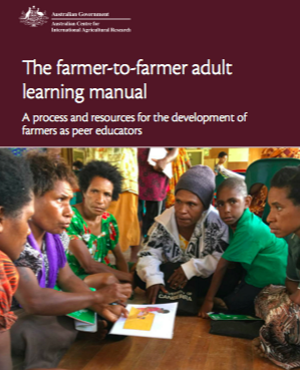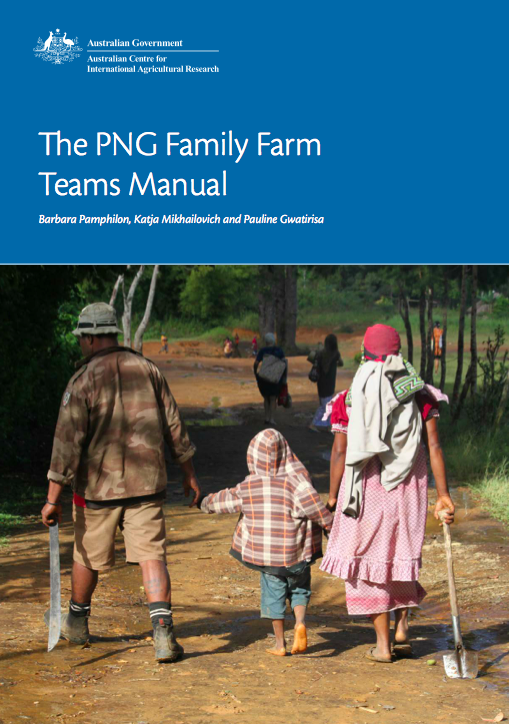Learning Activities
The following describes a range of collaboratively developed learning activities used in the project to date – educational activities that acknowledge local context designed to be inclusive and empowering for local women, their families and their communities, especially for those with low literacy
Please contact us for more information or detail on any of the learning activities as described below.
Village Community Educator Training
A process of providing training and mentoring to local women and men as adult educators who roll out training within their own communities. These are known as our Family Farm Teams Village Community Educators (VCEs). This is an important focus within the project that aims to ensure local community members develop adult education skills; skills that in the short-term contribute to the project but most importantly in the long-term are of ongoing value to them and their communities.
Click on the imabe below access Training Manual: The Farmer-to-farmer adult learning manual
Family Farm Teams Training
The Family Farm Teams training is provided to local project leaders and their village community education teams. All of the training is underpinned by a gender inclusion approach‑ that is the training is offered to both women and men in a family so that they learn together and can plan their family farm changes together. There are four modules that make up this program:
Module 1: Working as a family team for family goals (one day workshop)
This workshop introduces the concept of a family team as an effective and inclusive way to work as a smallholder family. Family heads engage in a range of activities that map their current division of labour and then together consider better ways to work as a family. The family heads also look at possible family goals and determine together farming goals, financial goals and general family goals.
Module 2: Planning your family farm as a family team (half-day workshop or individual activity with each family team)
In this activity, family heads/teams work together to map their gardens/blocks in order to identify their agricultural activities and space allocation, water sources, housing, animal shelters and other assets as well as noting terrain and travel time. They then draw how they would like to see their farm in five years. The final step is to identify the assets, constraints and challenges and possible solutions in order to design a one year, and three year plan of development.
Module 3: Feeding your family team
This workshop uses group activities to enable participants to identify the range of foods they grow and the ones they buy. The group work together to sort foods into food groups (energy, body building, health protection) and consider how to plan family meals across a 24-hour period that cover all groups. This activity is also undertaken for times of drought to enable families to have greater knowledge of how to adapt in times of food shortage.
Module 4: Communicating and decision-making as a family team (one-day workshop)
This workshop enables family heads to explore communication issues within the family and to consider the importance of shared decision-making, especially in the areas of family farm activities and financial decision-making. The activities cover skills and attitudes as well as exploring the cultural and gender dimensions of communication.
Click on the image below to access the Training Manual: PNG Family Farm Teams Trainers Manual
Training Partnerships
We partner with leading PNG training bodies who offer specialised training tailored for PNG
Financial Training
Integrated Agricultural Training Program of the University of Natural Resources and Environment—Record and Book-keeping
Nationwide Micro Bank —Budgeting, Mobile Phone Banking and Saving
Pacific Adventist University— Business training for families with low literacy
Agriculture Training
Fresh Produce Development Agency: bulb onion production, container gardening
Integrated Agricultural Training Program of the University of Natural Resources and Environment— Sustainable liveliehoods , village and commercial poultry, village and commercial piggery, soil management, vegetable production
National Agricultural Research Institute —agricultural training including farm production, crop protection and basic irrigation
University of Technology— poultry and stock feed production
Early literacy readers for children and their parents that also include key messages for improving family agricultural and financial practices.
Click here to read more about agricultural extension trials and about the background and development of these learning activities.

This work is licensed under a Creative Commons Attribution-NonCommercial-ShareAlike 4.0 International License.



